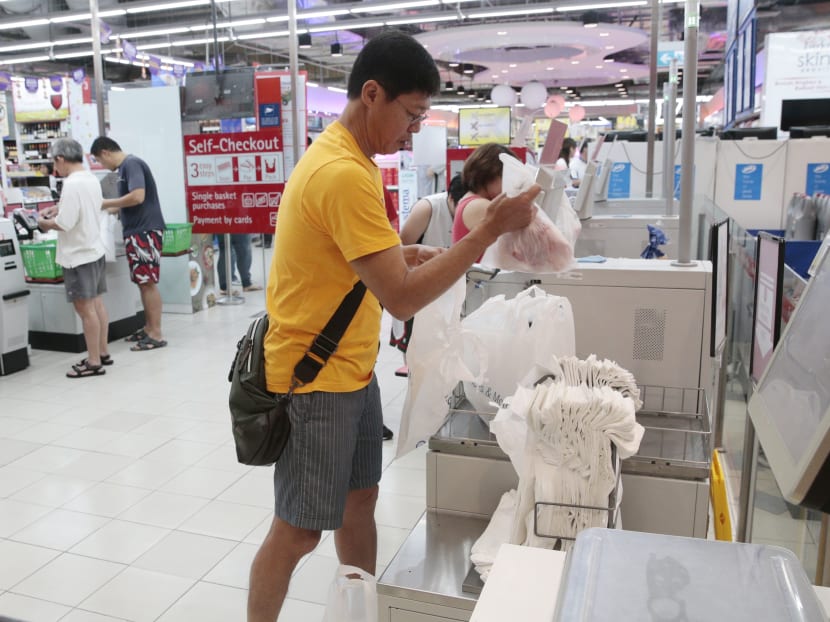No plastic bag surcharge as ‘greener’ disposables not better for environment
SINGAPORE — Often touted as “greener” alternatives to plastic bags, paper and degradable bags may not actually be better for the environment — at least not in Singapore’s case.
SINGAPORE — Often touted as “greener” alternatives to plastic bags, paper and degradable bags may not actually be better for the environment — at least not in Singapore’s case.
Compared to plastic bags, they may require as much resources to produce and have a similar environmental impact, as waste here is incinerated before going to the landfill and not left to decay.
Revealing the findings of a study commissioned by the National Environment Agency (NEA) on Tuesday (March 6), Senior Minister of State (Environment and Water Resources) Amy Khor said the authorities would thus not impose a charge on plastic bags.
“Imposing a charge or ban on disposable plastic bags and substituting them with other types of disposable bags is unlikely to improve environmental outcomes,” said Dr Khor.
Whether retailers should charge for plastic bags to curb excessive consumption has been a long-running debate here. Last year, four major supermarket chains were reportedly in talks to charge for plastic bags.
The study – by National University of Singapore academic Kua Harn Wei – concluded that consumers could reduce their environmental impact by often using reusable bags and food containers instead of disposables.
Dr Khor said the Government will step up engagement with stakeholders.
Some of its measures include disallowing the use of disposables for dine-in customers at new hawker centres, such as at Our Tampines Hub, Pasir Ris Central and Yishun Park. The rule will also apply at 13 other new hawker centres that will open by 2027.
Dr Khor was responding to questions by some Members of Parliament. Ms Cheng Li Hui (Tampines) and Non-Constituency MP Dennis Tan asked about the possibility of imposing a levy to cut excessive use of plastic bags.
Packaging waste made up a third of the 1.67 million tonnes of domestic waste generated here last year.
About 15 per cent of the packaging waste – or about 83,550 tonnes – is made up of plastic and paper disposables, such as single-use plates and take-away food containers.
Dr Kua’s study, which began in Sept 2016, found that plastic bags designed for a one-time use had the biggest impact on the environment. Greenhouse gases are generated to make them from fossil fuels (crude oil), and when the bags are incinerated.
Some businesses offer oxo-degradable bags as a more eco-friendly alternative. But the additives that help to speed up the degradation process could interfere with the recycling process when mixed with conventional plastics.
They also require a similar amount of resources to manufacture as plastic bags.
Paper bags are derived from trees and require a large volume of water to produce. They are also unable to bag wet items.
A reusable bag used over a year could save 125 plastic or degradable bags, or 52 paper bags, Dr Kua found.
“Taking into consideration both the monetised cost and environmental impact, reusable bags emerged as the most environmentally-friendly option for carrying groceries and similar items,” said the NEA.
The study also found single-use plastic plates and containers generated the most greenhouse gases and consumed the most energy.
Paper plates require large tracts of forest land to be modified, while single-use paper boxes with plastic lining are energy-intensive to make.
Biodegradable corn-starch containers are becoming more common in Singapore. But forests may be cleared and large amounts of water are needed to grow the corn.
Meanwhile, the environmental impact of polystyrene was found to be lower, but they use up Singapore’s limited landfill space.
Porcelain plates or reusable containers used over five years could replace 3,650 single-use containers, Dr Kua found.
Dr Khor said the Government will reduce packaging waste upstream. By 2021, businesses will have to report the type and amount of packaging they put on the market and their plans for reduction. Industry consultations will start this year.
To NCMP Leon Perera’s question on microplastics – part of the growing problem worldwide of marine trash – Dr Khor pointed to anti-littering laws and beach clean-ups.
During the treatment of used water, microbeads, a form of microplastics, are also “substantially removed as sludge and disposed of by incineration”, she said.







